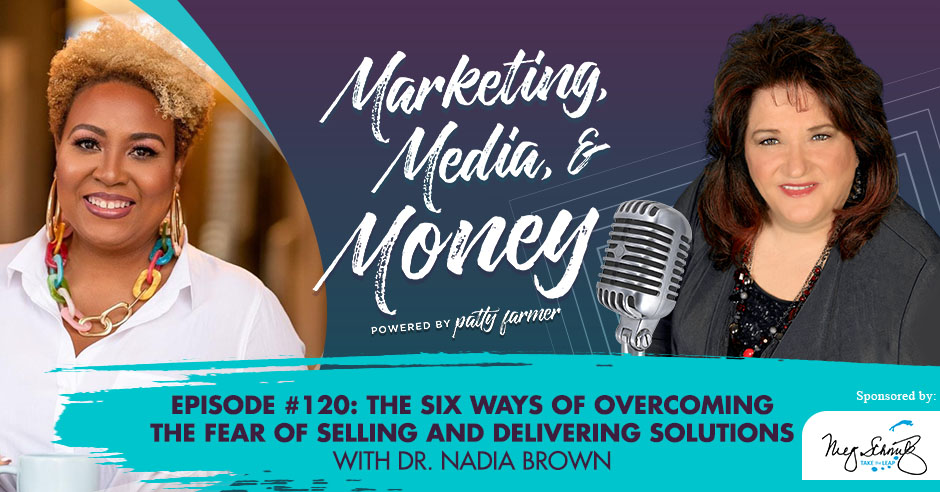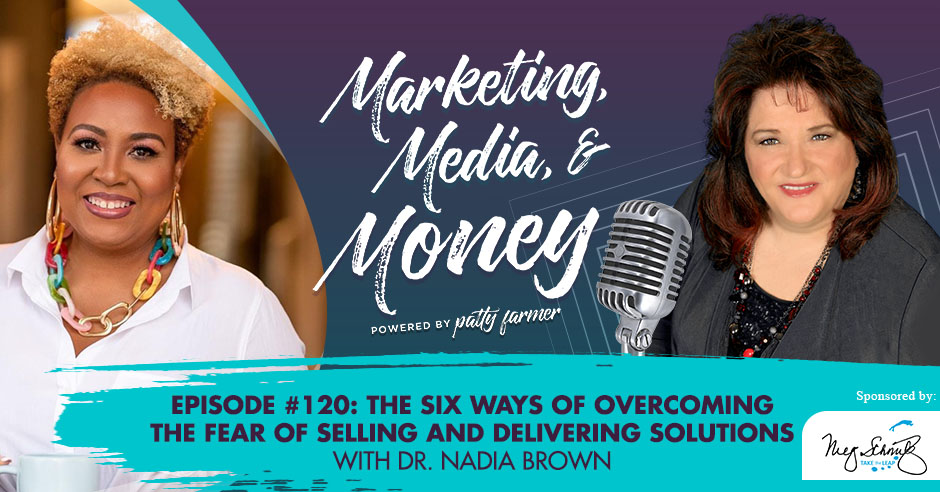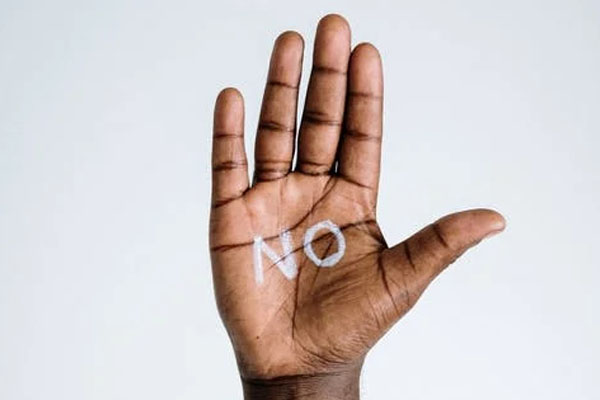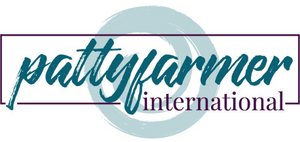Want to know the 7 key areas
needed to ramp up your business?

The Six Ways Of Overcoming The Fear Of Selling And Delivering Solutions With Dr. Nadia Brown (Episode 120)

Click on the icon to listen to this episode on your favorite podcast platform.
Nadia’s Gift: DiscoverYourSalesBlindspot.com
Nadia’s #1 Marketing, Media & Money Strategy
DID YOU LIKE THIS EPISODE? PLEASE GIVE IT A RATING AND REVIEW
About Dr. Nadia Brown
 Dr. Nadia Brown is a sales strategist, consultant, trainer, and founder of The Doyenne Agency. A sales agency that works with business owners, companies, and corporations to multiply revenue and awaken the consistent closer within your sales team using the Consistent Sales Method™. Nadia brings over fifteen years of experience in leadership, powerful conversations, achieving goals, and respect for people to develop a comprehensive sales process to increase closing rates and satisfied client retention. Nadia’s clients have seen massive results, such as raising their rates, decreasing their refund requests, and doubling or tripling their annual revenues, including helping clients increase their yearly revenue by 800%.
Dr. Nadia Brown is a sales strategist, consultant, trainer, and founder of The Doyenne Agency. A sales agency that works with business owners, companies, and corporations to multiply revenue and awaken the consistent closer within your sales team using the Consistent Sales Method™. Nadia brings over fifteen years of experience in leadership, powerful conversations, achieving goals, and respect for people to develop a comprehensive sales process to increase closing rates and satisfied client retention. Nadia’s clients have seen massive results, such as raising their rates, decreasing their refund requests, and doubling or tripling their annual revenues, including helping clients increase their yearly revenue by 800%.Resources and Important Links
- The Doyenne Agency
- https://www.Linkedin.com/in/drnadia/
- https://www.Facebook.com/TheDrNadia/
- https://www.Youtube.com/user/DoyenneLeadership1
- https://Twitter.com/iamdrnadia
- https://www.Instagram.com/iamdrnadia/
- DiscoverYourSalesBlindspot.com
- Selling Like a Lady: Courage Diary
- Free Marketing, Media, & Money Assessment
- Check Out Our Sponsor
- Take the Leap Franchise Consulting
Grab Your Free Marketing, Media, & Money Assessment
Meet Our Sponsor
The Marketing, Media, & Money Podcast (and magazine) would like to thank our sponsor Meg Schmitz, founder of Take the Leap franchise consulting company.
The franchise industry is booming as people look to diversify their income streams with essential businesses, without having to quit their day job. If you have ever considered what it would be like to own your own business with the security of a solid brand behind you, schedule a call with Meg. The conversation is free, and the insights are priceless. https://MegSchmitz.com
The Six Ways Of Overcoming The Fear Of Selling And Delivering Solutions With Dr. Nadia Brown
Changing Your Perspective
I'm looking forward to sharing our industry expert with you. In this episode, we are going to talk about something that everybody wants to talk about but not everybody knows how to do it well. It's a good thing that we are going to talk about it because we are going to talk about sales and selling. More importantly, we are going to talk about how you can overcome the fear of selling. Make sure you get your pen and paper ready because we have an expert who is so good at it that she can help her clients increase their yearly revenue by 800%. That's pretty strong. If that didn't get your attention, let me tell you a little bit about our guest.
Dr. Nadia Brown is a Sales Strategist, Consultant, Trainer, and Founder of The Doyenne Agency, a sales agency that works with business owners, companies, and corporations to multiply revenue and awaken the consistent, closer within your sales team using the consistent sales method. Nadia brings over many years of experience in leadership, powerful conversations, and achieving goals and respect for people to develop a comprehensive sales process to increase closing rates and satisfied client retention.
Nadia's clients have seen massive results such as raising the rates, increasing the refund requests, and doubling or tripling their annual revenue, including helping clients increase their yearly revenue by 800%. Working with The Doyenne Agency is not an expense. It's a revenue multiplier. I love that so much. Thank you for being here with me, Dr. Nadia.
Thanks for having me, Patty.
You had me at revenue multiplier. I love that so much because many people are doing all these things to generate revenue. That's the number one thing that everybody wants, "How do I generate more revenue?" The thing is that they don't want to do sales because they have the fear of sales. I am thankful that you are going to be here so that we can talk about that. Let's back up a little bit. Tell me a little bit about how you became a sales strategist and why this is something that you love to do. Why is it your passion? When people have a fear of something, they are not always the funnest clients.
This is true. To back it up, I didn't like sales. That was how I started my own journey. I always say I was the least likely person to lead a sales agency of all things along my journey of getting over my fear of sales and learning how to sell in a way that worked for Nadia. That was also effective. I found that there were a lot of other people like me that was excited about the work they did but didn't know how to do sales or do it in a way that worked for them. That was when I was like, "I can help people with that." I was reluctant to do so.
I say that because there are a lot of negative connotations around being a salesperson. It's that no one wants to talk to the salesperson but there are those in my circle that were like, "No, Nadia. You have an interesting perspective but then also being able to help clients achieve their goals." It was like, "I get this." One of the things I'm most passionate about is when I can help a client increase or multiply their revenue because it opens up so many more doors beyond the clients that they get to serve. It impacts their personal lives and families. It's such a massive ripple effect that I enjoy.
I love that too, because many times, being in marketing myself, a lot of people think marketing and sales are the same things. We know that they are not. One of the things that people think because I get this a lot is that we need to give them more information. We are in the information business. I always tell my clients I'm not in the information business. Google is in the information business. I'm in the transformation business. I believe it's that way with sales too.
A lot of times, people don't realize it, and it's a shift. One of the most important things in sales and marketing is what is that shift because that's where it starts for me. I know that you are going to talk about this a little bit deeper, so I want to start with that. Everybody, in the beginning, has a fear of sales. A lot of times, it's because we think of it as selling. For me, the biggest shift was shifting my mindset from selling to being of service.
That's a big shift. One of the shifts that I had, especially around fear of having this conversation, was it's not just a sales call. It's an actual conversation with another person. I was like, "I can talk to people. That's not hard." That was also a big shift for me. Don't go into it thinking it's a sales call, and my only focus is to get a credit card number at the end of this call. It's like you said, "I'm going in to serve but I'm also going in to focus on relationship and get to know this person and understand what it is that they may need, desire or need support with and how my company can help them do that." When you go into the conversations in that way, it starts to take away a lot of the fear and trepidation that people feel around having sales calls.
That's true too. I know that probably everybody that is reading this at one time or another, maybe even many times, where you've had a conversation with someone. They are already starting to tell you what the solution is and don't even know what the problem is. You can't provide a solution if you don't know what the problem is. Maybe you should ask questions and listen before you offer a solution.
It is very easy to tell whether it's virtual or in-person to me to tell when somebody is truly listening to learn or when they are listening for you to just take a pause so that they can tell you what their solution is, whether or not it is the solution to your problem or not. That's where the shifting from sales to service is because if you are truly coming from a service mentality, you have to listen to be able to know how to serve them. In reality, sometimes being of service means that they are not your client. If you've built a network, maybe the service is referring them to somebody else in your network.
I love all of that. You took this note from my training. That's exactly what I help clients, especially those that have that fear of selling. Go in with powerful questions. Take a moment. Think about the questions that you want to ask so that you can best understand if they are a fit and which of your solutions because most of us have more than one, is the best fit for supporting them in their problem. I'm still an old-fashioned note-taker. I have a notebook and paper, and I'm actively listening.
Your role is to almost be like that investigative reporter like, "I need to get this real scoop," so you get to understand what is it that they are up against and their challenges so that you can make the best solution. Also, it helps you to connect and understand whatever their fears, concerns or objections may be but they don't feel like objections when you understand where that person is coming from. You can only do that through listening and active listening. As you said, people can tell the difference.

There are a lot of negative connotations around sales. Most of the time, no one wants to talk to the salesperson.
A lot of times, when you get on the phone with someone, the reality is they have already been burned by somebody else before. They've already had some situation that's happened, and you need to take the time to listen to what they are saying to you, how that came about, what they took away from it, and what their fear is. You are thinking about what your fear of selling is. Their fear too is that they have been burned before. What are you going to do differently? One of the things that I know, when I have calls with people, is your credentials are important but I don't think it's the most important. I don't think people should start their conversation with that.
They already know that, or they wouldn't have got on the call with you in the first place. The reality is, I believe, and I want to know your perspective, is that these are your credentials. I love it but what I want to know is what you can do for me and my business to get me the results that I want. If I have been burned before, what are you going to do differently? That starts with listening to me when I tell you what those things are. If you aren't even listening to that, how are you going to listen to me and tell me what you are going to be able to do differently?
I 100% agree. Not getting in our feelings feels like it's a personal attack. It's not personal. I'm addressing it. I'm going to sales conversations as a buyer. Those are exactly the things I'm listening to. How do you treat me during the sales conversation? Are you dismissive? Do you take my concerns and poo-poo on me like that? Do you really take the time to understand where I'm coming from to truly address them to answer those deeper questions that I have? A lot of times when they get on the phone with you, there are a lot closer to a yes than we realize.
Based on how we answered their questions, if we are listening or take the time to fully understand is when we start to "lose the sale." One of the things you mentioned at the beginning of our conversation was, "What if you are not the right fit?" One of the things that I like to do in a lot of conversations is set that tone. If we are not the right fit, I am more than willing to share that with you at the end of this conversation and refer you to someone in my network. It helps to put people at ease because they have been burned. They have been in those conversations at no cost.
At any cost, we are going to close this sale, even when they know that it's not the best fit. It's putting people at ease at the beginning of the conversation like, "We are here to find out if we are a good fit to work together. If it's not a great fit, then I would be more than happy to refer you to someone in my network." It helps to set the tone but it also helps people to relax and be a lot more forthcoming during your conversation.
I have to think back. One time when I was talking to somebody, we were talking about a situation where they had got burned. They shared with me something that I almost fell off my chair. What they had told me is not funny but it almost is. They had told me that they were talking to somebody. When they told them that they wanted to think about what they had said and that they were going to want to pray about it, the person that they were talking to said, "That's a great idea. Why don't we pray now?" I was so blown away by that. I have never forgotten that scenario in my mind. I was thinking, "You have got to be kidding me." I can't even imagine somebody would say that, which is pretty hardcore sales.
I remember thinking, "That was sleazy slimy." I don't think there's a place for that anymore. That is so old school back in the day. It was sleazy then too but people are not going to put up with it anymore like that. It's not something that is going to be effective. I don't think it's about that if you are just having conversations because your time is an investment. Whether they hire me or not, I know that I'm going to be all in, and I want clients who are going to be all in. Otherwise, it's a lot of work, and you are trying to sell them on it over and over again.
If you do the work, in the beginning, to be clear so that you are both excited for the journey of working together and set the expectation and stuff, it's such a great experience. That's how we retain clients because it costs a lot more to find new clients and doesn't retain the ones we have. Do you have some ideas about that? Let's talk about that a little bit. In sales, it's a lot because if I hear one more person say, "To get yeses, you got to have more noes." I say, "Not really. To get more yeses, you get more yeses."
One thing that I wanted to touch on is honoring that person's buying process.
I can't believe someone said that.
It's unfortunate that it did but I could believe that. I remember this one woman in particular. It was an event we were doing sales for. The offer was $15,000 to $20,000. We had an initial conversation, and she was like, "Nadia, is it okay if I just sleep on this?" I was like, "Absolutely. What's a good time for us to touch base again tomorrow? Do you want to talk before the event starts? Let me know." We did. We touched base that the next morning, and she had a chance to sleep on it. I gave her the space to talk about it out loud.
I didn't get into my feelings because we get anxious and excited. I'm human. I'm giving her that space, and she was like, "I'm in." She then said, "Thank you for giving me the space to think about it." Most people have already been burned. Do I want to go through this again? Am I going to experience this again? You set the tone for that relationship in the sales conversation. It's such a wonderful thing and a reminder to me to honor that gift of listening and giving people space and not to rush it because you are excited or want to move on to the next person.
Especially events tend to be super high energy, there are a lot of moving pieces but it's that reminder for us to set a different example and honor them. Some people are super hard charters. They know when they know and are all in. Some people are a little bit slower but those tend to also be your longer-term clients. They are all in and are in for years. That is worth an extra phone call if it's needed.
There are people who are more action-oriented. They are super decisive and make decisions quickly. That is my type of thing but I've usually done all my work first, so by the time I get on the call, I am pretty much 80% into making my decision already. I have a few questions, and I'm pretty much ready already. There are people who want to know the process because sometimes it's about the process. I have a very distinct process when people work with me, and it isn't the right fit for everybody. I have to tell people right away. If they ask me that, "I work a little bit different than probably most marketing people that you know," and they are like, "How so?"

Fear Of Selling: A lot of times, that's where our fear really is. We're afraid of getting the NO.
A lot of those people are like, "I love that. That resonates with me." Some people want more of a bullet-pointed type of process. It's very creative. There are a lot of different things. I love that you said to honor their buying process because everybody has one whether they realize it or not. It is whether how they buy a car, a house or whatever the case may be. For some people, the process is the same but wouldn't you say that if somebody is thinking about investing $15,000 with somebody is not the same as a $97 downloadable thing?
Everybody has a level of what that price is. Mine is probably a little bit higher than most but I have a price point that I will learn from the funnel and the whole process because I'm in marketing, so I probably will spend a little bit more on that. I do have price points of what I need to know and have. Everybody is a little bit different, so I love that you said, "Honor their buying process," because that is so important. I've never heard anybody say it quite like that. I love that. That's a great hashtag. Let's talk a little bit about the six ways to overcome the fear of selling. Do you want to take us through those six ways?
The first way is to work on changing your perspective. Spend time digging a little bit deeper. Many of us think of a used car salesman but there may be some other things underneath the surface. One of the ways that I teach people to do that is you don't have to wait to get started. It's better if you start having sales conversations. Pay attention to what comes up for you.
Having Many Conversations
Pay attention to how you feel after the conversation. Start to pay attention to those cues because we all have our own personal triggers and things that may come up for us during a sales conversation. The second one is probably the one that is the least liked. It is to go out and have as many conversations as you possibly can.
It feels almost counterintuitive. It's like, "Nadia, if I'm afraid of having these conversations, why would I have the conversations?" I'm like, "That's exactly why you have the conversations." For fun, set the goal to get the noes. A lot of times, that's where our fear is. We are afraid of getting the no. We don't want to deal with whatever emotions, thoughts or stories come up for us when we get the no. If you start to have a conversation with the goal of getting a no, it starts to take the staying out of a no and the power away from the no.
The whole purpose is I want to take the power away from a no and start to focus on the yeses. I have had people do this, and no one has yet to ever call me back and say, "I've gotten 100 noes." It's always, "Do you know how many yeses I've gotten from all these cool clients because we were just focused on having the conversations?" When we go in with, "If I get a no, it's not life-changing," we have to have our story around how we are going to manage the no. It helps position us to get the yes.
Tracking Your Calls
Here's the third thing, and I mentioned it with the first one. Speaking of the Courage Diary, one of the reasons why I created it is to start tracking your calls. One of the reasons why I call it a Courage Diary is no matter how skilled we are as sales professionals, we cannot make anyone say yes. There are things that we could do to influence it but there's nothing we can do to truly make someone say yes. With that, I want you to start thinking about all the times that you had the courage to make the ask in the first place.
Thinking About Your Network
With that, it's one way of starting to track your success, progress, and ways to celebrate. You did your part. You showed up. You showed up on time. You asked questions. You were engaged. You asked for the sale, and then you have the systems in place to support you if for whatever reason someone says no. The fourth thing is something that you mentioned is to think about your network. Sometimes there is this enticement that we need to be all things to all people. I love that you and I are like, "We have our one thing. I am all about sales. Patty is all about the marketing."
If I'm having a conversation with someone, and I'm truly there to be a service and realized that this isn't yet necessarily a sales problem, you need some marketing work. There are some things that could help better support you or make it something else. I know people that do that work. I'm not now having to create a new solution in an area that I don't feel I'm disqualified for. I gladly refer that business out. When you look at your network as support to, "I don't have to be all things to my clients or even to my prospects because I know amazing people that will do right by their clients and serve them at a high level," when you go into those sales conversations, that took your level of service to a whole another level.
They appreciate that too, and I believe they will come back.
They do. I had this conversation with this amazing person. I wasn't yet ready, so they acknowledged that and put my needs above their own. That speaks volumes. Spending time building those relationships, building out your network, and knowing who and how to refer people will help you feel a lot more confident going into those conversations because you know that you can fully support that person, whether it's through your company or not.
Courage
The fifth thing is really looking at courage. I talked about that a little bit earlier but it's one of the most overlooked qualities when it comes to sales. We talk about having the conversation, confidence, and preparation but let's acknowledge that it does take a lot of courage to ask for a sale. It takes a lot of courage to particularly ask for the sale when you are the offer like, "My company created this. A lot of us are super creative, and we come up with these offers on these programs that are amazing." Now it's almost like I'm putting my baby out here to be judged.
I feel some way when you say no, even when it doesn't have anything to do with me. Take a moment to think about what courage means for you. Take the time to think through that courage and then create systems and supports around, "What happens on a bad day when I had a whole lot of sales conversations, and it didn't go my way? How do I take care of myself so that I don't allow those negative conversations to take me down?" I remember at the beginning that I got to know if it is going to be forever to get back in the game. Now it's like, "Nadia, shake it off. Get over yourself. Get back in the game and do whatever it is that I need to do to mentally prepare myself and keep myself operating at a high level mentally."
Systems And Processes
Number six is systems and processes. Sales is not just the conversation. Marketing and sales go together like peanut butter and jelly because there are things that you are doing even before you have a sales conversation. There are things that you can be doing even after the sales conversation even if you get a no in that initial conversation to continue to build that relationship and let people know how you can best serve them. To your point, Patty, a lot of people who are coming to us have already been burned.

Fear Of Selling: Spending time building those relationships in your network and knowing who to refer to will help you feel more confident going into conversations because you can fully support that person whether it's through your company or not.
Even when we show up at our best, it still might not be enough yet for them to say yes, depending on what their previous experiences have been. It has nothing to do with us. Once you have had that conversation, and we are now in that space of, "I know you. How can I can best serve you?" my goal is to continue to share, touch base, and honor your buying process.
Let you know and further put your fears at ease that your experience with my company will look very different than your experience with someone else. What are the sales systems that you can put in place so that you don't drop the ball? Remember to make that follow-up call and send that email because there are a lot of times and ways that automation can support us in that.
There are several things I want to unpack there. There are three specific things that are important that I want to say. A lot of times, people don't realize, especially in a sales call, that when somebody is coming to you about marketing or sale, some of those things are a little bit tougher. To answer your questions to see if you are the right fit, they have to tell you the story. Sometimes the story is ugly. Let's just say that. It's not always but sometimes the story is ugly. They got to tell you how they did this. They have to own a little bit of the story like, "I didn't do this," and whatever that case is.
For me, it's recognizing and knowing that if they say no, think about that. The reality is nobody wants to have 6 conversations with 6 different people and tell that ugly story. If they are spilling their guts and telling you that story, the reality is they are already pretty much thinking about hiring you or wouldn't want to tell that story. The question here is if you don't get the yes, why? Why didn't you get the yes? It's about honoring that process and understanding that maybe that story was a little ugly or not so much. Whatever that was, they did share it with you, so there was already somewhat of a level of trust there.
Honor and hold the space for that to help them see that maybe they want to say yes but they need you to help them. What is it that's standing in their way? Instead of trying to show, call, and have hardcore sales here and tell them all the reasons why they should do it, realize that they will tell you if you ask. That is important. I can't tell you how many times I've said to somebody, "I'm feeling like there's something standing in your way. If you are willing to share that with me, maybe there's a way that I can help you."
It could be something as simple. Off the top of my head, I can think of times when somebody has said to me, "Patty, I really want to hire you but you said that you don't write copy, and I know I'm going to need help with copy." That didn't have anything to do with me, so it was easy for me to say, "What if I work with some amazing copywriters? What if I could bring one of those copywriters in to help us with that part?" They were like, "That was amazing."
Don't always assume that it's you. It could be something. I believe that once you solve a problem, it illuminates another problem. People are like, "What?" It does. If I helped them with the most amazing marketing and now they are like, "I have to get a website now," that's another problem. You got to know that it's a whole process.
I want to be the trusted advisor and build a relationship with that person so that when some of those other things come up, I can help them with that too. It's sending them to somebody in my network that now builds a relationship with me. They didn't want to go tell that story to somebody else either. They would love it if I would just help them with that too. That is something that you said is important.
The other thing I want to say is when you were talking about the ask. Here's what I'm going to say. It is amazing to me. How many times have you had a conversation that's just a connection call? It's not even a sales call. It's a connection call from a networking group or whatever, and you are having this great conversation, sharing what you do. In the end, they say, "How can I serve and support you?" They are asking you, and you don't even know what to say.
I can't even tell you how many times people said, "People ask me how they can service for me. I don't even know what to say." If you don't know how to tell somebody how they can serve and support you, how are they going to be able to? That's not even asking for the sale. That's asking for service because they want to serve you. A lot of times, you have to ask yourself, "Are you able to do that?" A lot of times, I help my clients with like, "Here are some easy asks." When you see that fear, it shows up in other ways too, not just asking for the sale, which leads me to the third thing, which is about your Courage Diary.
She has talked a little bit about that. What she hasn't told you yet is that you can get your own. I love that she has that. Her book is Selling Like a Lady: Courage Diary. Having a Courage Diary, if, for nothing else, it is for you to see what are you doing well and what could you need a little bit of help with and to see a pattern. It's because it's part of the process. It is seeing the patterns and stuff. That's what I took away from that. That was a whole lot. What do you think about that?
I love that you pulled all of that out of that. One of the questions I ask in the Courage Diary is, "Where did this lead come from?" When you are having those conversations, the patterns start to emerge. Sometimes we don't track because we are not you, Patty. We don't necessarily track where leads are coming from but you are getting some good ones. Do more of that in your marketing because that impacts your sales. I have had my moments where people have asked me, "Nadia, what can I do to support you?" I'm like, "I don't know. Let me get back to you because my brain is not even in that."
A lot of times, it's because you came to serve. You show up to serve, and then they ask you, and you are like, "I wasn't prepared for that. I was prepared to come and serve you." A lot of times, it's that. I have a question. You have been doing this for years. What would you say is the number one myth that people have about sales?
One of the biggest myths, because I hear this one a lot, is that only extroverts make good salespeople. I'm an introvert, and I have found that introverts are great salespeople probably because we tend to be more inclined to listen. Listening is the secret weapon when you go into sales conversations. Another myth is that people feel like they can somehow coerce or are forced someone to buy. There are ways that we can influence in there and things that we can do. Even if they are not necessarily ethical, we might consider them sleazy. Ultimately, the power does rest with the buyer as to whether or not they are going to make that decision.

Fear Of Selling: Take the time to think through that courage and then create systems and support around it. Don't allow those negative conversations to take you down.
I find that for me. What I believe is that a lot of the time, people have been hearing for so long about making sure that you are talking to your target market. I'm in marketing, so I believe that's step one. The reality is you need to be having more conversations with your target buyers, which are not exactly the same thing because your target market is people who have the problem that you have the solution for. A target buyer is somebody who has the problem that you have the solution for but they are actively looking for a solution.
A lot of times, going back to what you were saying, having the courage to ask questions, and learning what are the things that are standing in their way can help you to know to qualify some people. Are they a target market? Are they your target buyer? We all know that there's a customer journey. In that customer journey, people could be aware, and then they are ready to buy. There are places in between there. All of that has nothing to do with you. Your job is to guide them through the process, so when they're ready to raise their hand and say yes, you are the one that has helped them to get there. Sometimes we put way too much pressure on ourselves.
We think we have a lot more power than we do to have those conversations. A lot of the things that buyers are thinking about as they are making the decisions have nothing to do with this. Our job is to guide them to be that trusted advisor, that person that they trust and know that could ask these questions I can get support. You are going to be honest and not just sell them a solution because you want to make a sale. That is huge, and it helps you stand out in the marketplace.
I want to make sure that I serve and support you, Nadia. Who is an ideal client for you?
We serve two different clients. One is someone we've talked about who was challenged with sales and having those strategic conversations and systems. We help them through a training intensive that we have. Another client that we serve is someone who's already pretty much had all that dialed in. They serve their clients through multi-day events. We support them with sales at the back of the room. A lot of times, those are two very different buyers but those are two ideal buyers for us.
I love that because both of those people are ideal buyers for me. Nadia, thank you so much for being here. Because you are so generous, you brought a gift, and I love this gift. I want you to talk about it a little bit because this gift is around the sales blind spot. Tell us a little bit about it.
Through my years, I've noticed that there are a couple of different sales personas but also certain blind spots associated with the different personas. We put together our Discover Your Sales Blind Spot quiz. It takes about two minutes but it also gives you some ideas about where your blind spots may lie. We give you some ideas on how to address those blind spots to help you be more proficient in sales. You can grab that at DiscoverYourSalesBlindspot.com.
You gave us so much information. This has been a fabulous call. Thank you so much for being so generous with your expertise. This show is Marketing, Media, & Money. Money is sales. What would you say is the number one Marketing, Media, & Money strategy?
Sales is a team sport. We talked a lot about you as an individual but we've also shared how we've leveraged our communities, networks, and businesses. There's a big shift away from solo salespeople doing it alone. There are different ways that you can leverage team members or have salespeople in your process. I'm starting to see more people accept and embrace how different teams work together to help a company reach its sales goals.
That's a great strategy. Thank you for sharing it. Nadia, I know people are going to want to connect with you. What is the best way for them to connect with you?
That would be over at our website, which is TheDoyenneAgency.com.
Thank you again so much for being generous and sharing your brilliance. I love that. I feel like we could have you back again. There's so much more that we could unpack, and we did a great job. Thank you so much for being here.
Thank you.
Thank you so much to our sponsor, Meg Schmitz. She's the Founder of Take the Leap Franchise Consulting company. The franchise industry is booming as people look to diversify their income streams with essential businesses without having to quit their day job. To learn more, schedule a call. Go to www.MegSchmitz.com. The conversation is free but the insights are priceless. Talking about quizzes and assessments, if you would like a simple answer to the question, "Where should I focus my time and energy to attract highly qualified ideal clients?" I invite you to take the Marketing, Media, & Money Assessment and go to www.M3BizQuiz.com.
To the readers, thank you so much for joining us on the Marketing, Media, & Money. If you enjoyed our episode, and I am sure you did, please subscribe and review the show on your favorite platform. Thank you so much for spending time with us. We appreciate it. We hope that you have a phenomenal day. We will see you again next episode.
